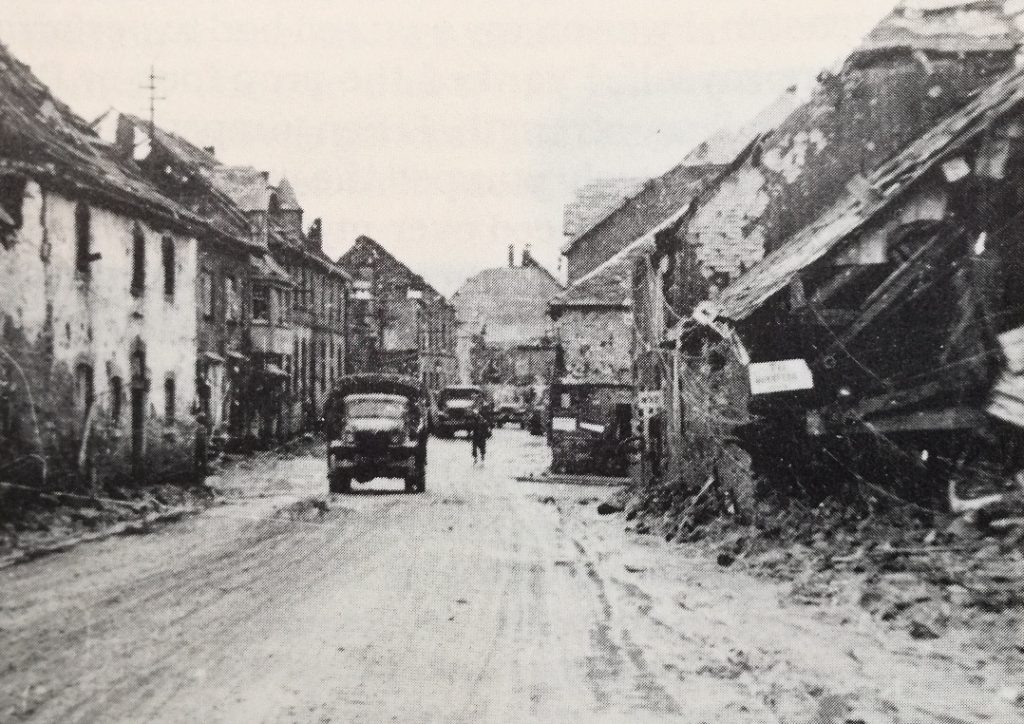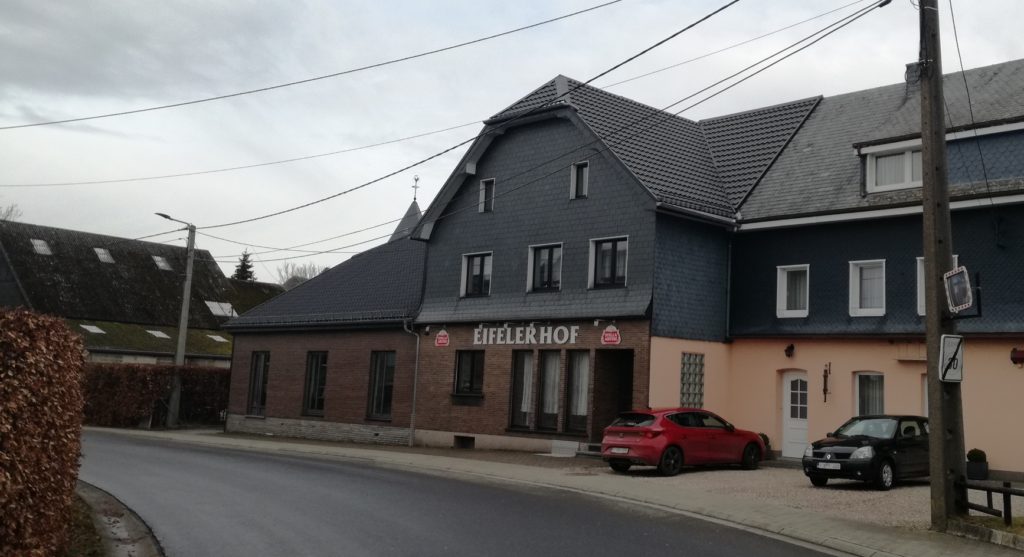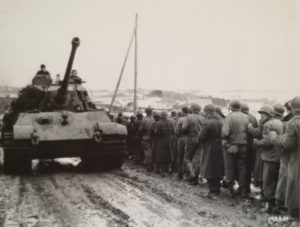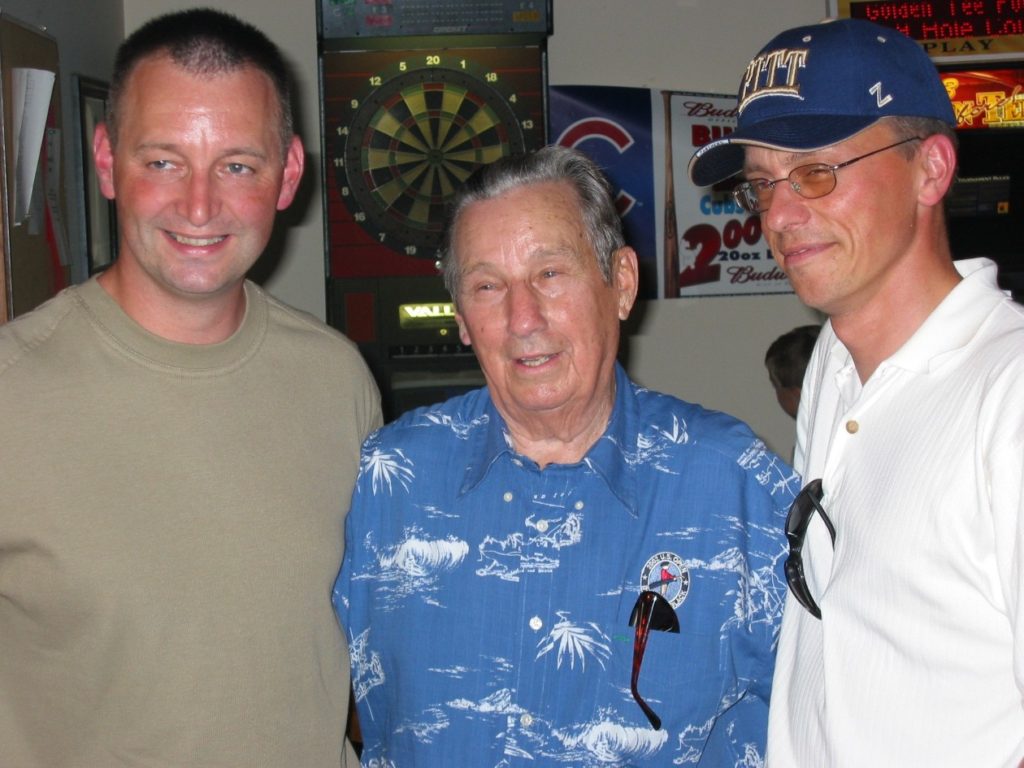Roger V. Foehringer
Service Battery – 924th Field Artillery Battalion
Part Two – Captured!
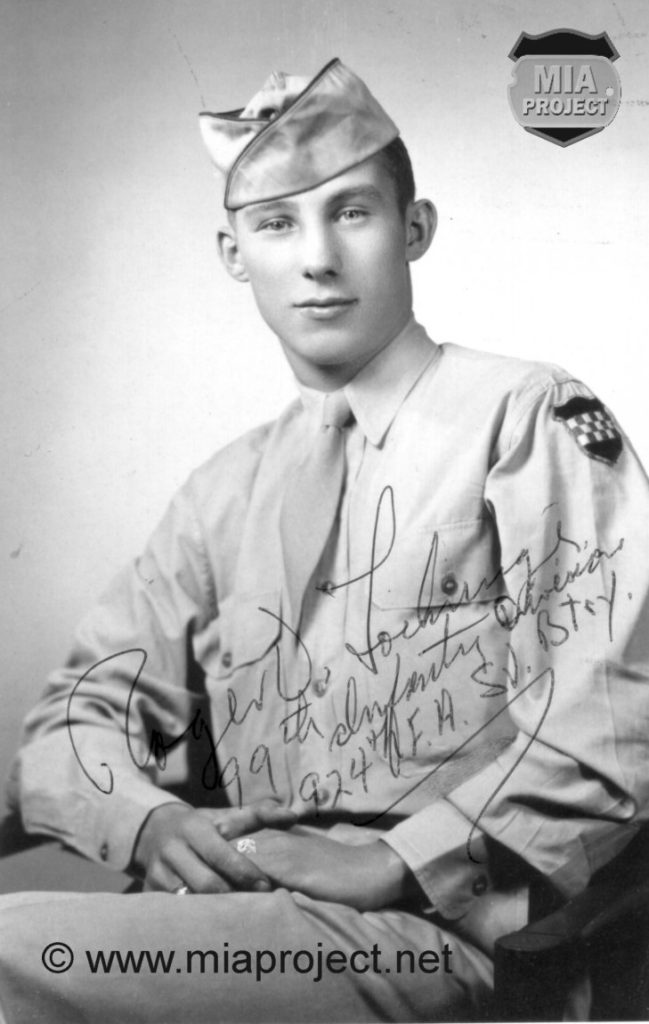 Büllingen, Belgium – November 1944.
Büllingen, Belgium – November 1944.
The second week of November, the 924th Field Artillery Battalion left its assembly area and was deployed on line. For its part, Service Battery moved to Büllingen, Belgium. When Roger jumped out his 6X6, he was just 5 miles from the German border.
« … We had billeted in a farmhouse on the outskirts of Bullingen, Belgium. The house was a combination home and barn. The barn being connected to the house at the rear. We were all comfortably set in this house. The winter had set in and it was cold and snowy. Although I was not suffering as I was with the Artillery and we had a warm bed. In fact, I picked up out of an old Belgian farmhouse, a foldaway cot which I threw onto the 6×6 so I had a bed to sleep on wherever I went. Probably the 1st, 2nd or 3rdof December, snow was making it difficult for us to drive and get our supplies to the 105 gun batteries. We were bringing their food and their ammo in daily. Periodically I was asked to go out with a forward observer party, a forward observer Officer, a radioman, a jeep driver, myself. We’d go through at night, stay until the next day and radio back German positions to our artillery units for their firing. We would then return. I only did this a couple of times, it really scared the hell out of you. Many times you were all by yourself and didn’t know which way home was. But I did get back safe and sound.
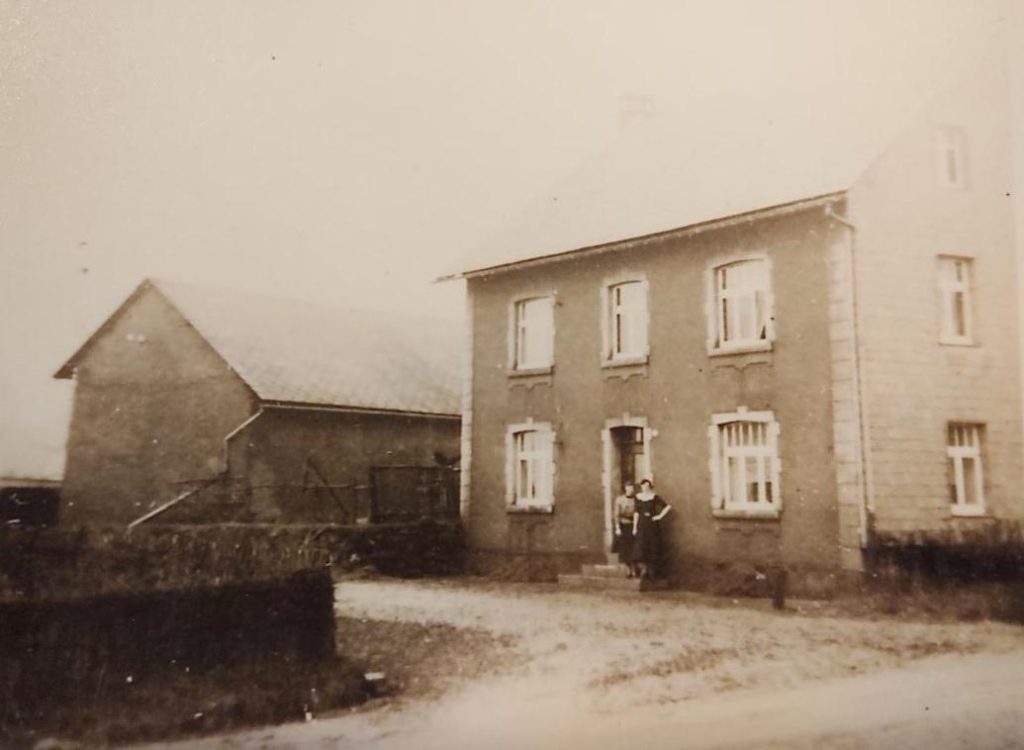
Pre war photo of Büllingen #119, the farm occupied by Roger and his squad (courtesy R. Foehringer, Jr)
So all and all, my duties were not very awe inspiring, I had a warm bed just about every night and I had good hot food every day. So it wasn’t bad at all, never expected what was going to happen.. »
« … I was on guard duty from midnight until 4 A.M. that night, the 16th of December. During the night a group of M8 scout cars from a cavalry reconnaissance group, pulled down the road at the farm. Excited to tell us that the Germans had broken through somewhere east of us and that they were trying to get out of there. I notified Captain Cobb of this and he alerted the troops. He called Division Headquarters and was told that we should dig in on either side of this small farm road, in this hilly country. Nearby was a landing field for the Piper Cub, our field artillery observation planes. There was a number of planes parked on the grass area, just off the side of this road. My guard duty was over at 4 A.M., I went back to the farmhouse and climbed back in to my sack to get some rest… »
Despite alarming and contradictory information, the situation downtown Büllingen remained quiet. Preparation to evacuate vital equipment and vehicles was underway and the defense of the town was taking shape.
Much of this preparation had taken place while Roger was sleeping.
« … I was awakened at approximately 07:00 and was told that we were digging in, taking the machine guns off our 6×6 and moving them up a small hill to set up some type of resistance to the German advance. We were not advised exactly what type of German troops were coming our way. A Corporal grabbed me and another guy and told us we were to take a case of grenades up the hill to one of the machine gun positions. The three of us, another PFC, the Corporal and myself started down the road and up the hill. I was on the left hand side, grabbing the handle of the grenade case, the other PFC grabbing the right-hand handle and the Cpl. next to him. We were not to the point where we could see over the hill, when down upon us came a German tank. This was a small farm road and the side that I was on, was lined with a row of hedges, bushes.To the right was the air field where the Piper Cubs were and was level ground. Needless to say I didn’t have stage fright, I jumped over, through and around the hedgerow, while doing so I lost my M1 carbine and my helmet, tore my field jacket, but made it safely. The German tankers were probably as surprised as we were. They didn’t shoot at us immediately, the only shots that were fired at me were machine gun bursts over my head, through the bushes. I lay there flat on the ground right at the base of the bushes and the next tank went by completely missing me. The other vehicle that came by was a half-track with infantry loaded in the back, there must have been ten or twelve German Infantrymen, there was a pause and this was my time to break away. To get away from the activity of the road I kept on a perpendicular course until I got several hundred yards away from the road and the Germans. I then turned and went back toward the village of Bullingen and to the farmhouse where I had last seen my other buddies. There is no feeling like 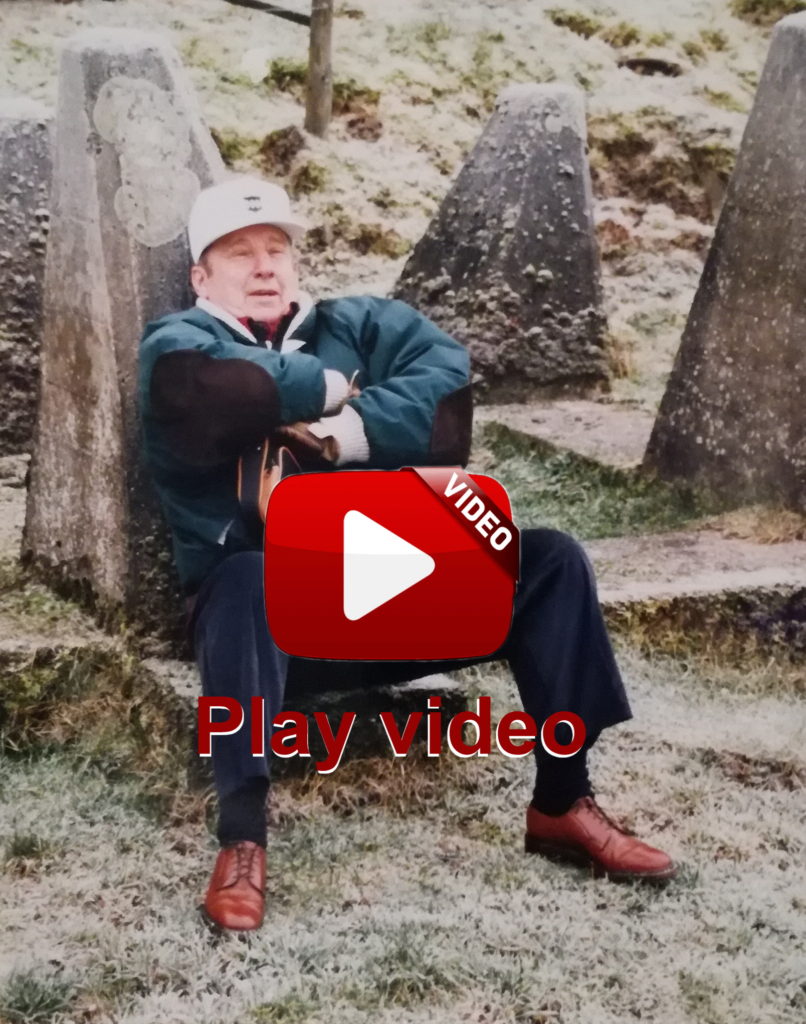 being alone, being unarmed, and having the hell scared out of you a few minutes ago and not know exactly what the hell to do. This was my position and my thinking as I rounded the corner of the barn connected to the farmhouse. As I rounded the corner, a blast of air, which I thought was machine gun bullets or some other type of weapon hit me full blast. I hit the ground and creeped and crawled into the barn. I laid on the ground feeling myarms, legs, nose, ears, everything, to see where I was hit, as I knew I had been shot. But there was no blood and no pain. I then looked out and in came running one of my buddies, Al Goldstein, a Jewish boy from Detroit, Michigan. He had just fired a bazooka, he was coming in with it and he was going to re-load it with another rocket. I then realized what hit me. It was the backlash of the bazooka rather than any machine gun or other weapon. But it sure felt like I had a hole in me the size of the bazooka, yet I wasn’t touched. I helped Al load the thing and crawled out with him. His first rocket had gone over the top of the tank, which had stopped on the road just out in front of the farm house, and hit awall of another farm the other side of the road. When he fired the second rocket, again it went right over the top of the tank, we were firing too high. At this point the tank crew must have gotten a little excited, as they gunned up the motor and started to swing the turret towards our position. Al and I got inside the farmhouse as fast as we could. There were some other GI’s including the cooks of our service battery. A couple of us found some carbines, went up to the second floor and looked out through the back window, which was the way the Germans were coming. We could see that the Germans had fanned out to the field that I had just come and had taken the machine gun nest we had planned on supplying with grenades. We broke the w
being alone, being unarmed, and having the hell scared out of you a few minutes ago and not know exactly what the hell to do. This was my position and my thinking as I rounded the corner of the barn connected to the farmhouse. As I rounded the corner, a blast of air, which I thought was machine gun bullets or some other type of weapon hit me full blast. I hit the ground and creeped and crawled into the barn. I laid on the ground feeling myarms, legs, nose, ears, everything, to see where I was hit, as I knew I had been shot. But there was no blood and no pain. I then looked out and in came running one of my buddies, Al Goldstein, a Jewish boy from Detroit, Michigan. He had just fired a bazooka, he was coming in with it and he was going to re-load it with another rocket. I then realized what hit me. It was the backlash of the bazooka rather than any machine gun or other weapon. But it sure felt like I had a hole in me the size of the bazooka, yet I wasn’t touched. I helped Al load the thing and crawled out with him. His first rocket had gone over the top of the tank, which had stopped on the road just out in front of the farm house, and hit awall of another farm the other side of the road. When he fired the second rocket, again it went right over the top of the tank, we were firing too high. At this point the tank crew must have gotten a little excited, as they gunned up the motor and started to swing the turret towards our position. Al and I got inside the farmhouse as fast as we could. There were some other GI’s including the cooks of our service battery. A couple of us found some carbines, went up to the second floor and looked out through the back window, which was the way the Germans were coming. We could see that the Germans had fanned out to the field that I had just come and had taken the machine gun nest we had planned on supplying with grenades. We broke the w
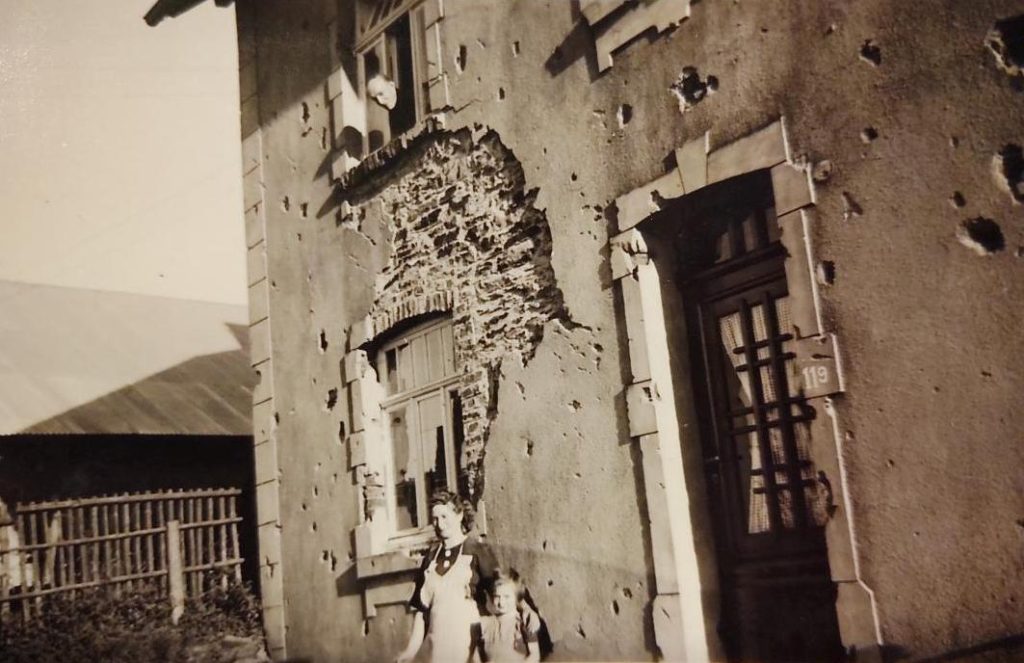
Post war photo of Roger’s quarters in Büllingen. Note battle damaged frontage (courtesy R. Foehringer, Jr)
indows and started to fire at these troops. They were sitting right out there in front of us, it was really easy shooting, but shortly we could hear the rumble of the tank. The farmhouse began to shake and we decided that the “Better Side of Valor” was to hide. We got down into the basement and busted up the carbines so that nobody else could use them. In the basement were the rest of the troops, five or six of the battery personnel, no officers, no NCO’s, just ordinary privates and PFC’s. Our plan was to hide out in the basement hoping that the Germans would go by, but of course, the bazooka had gotten their attention and they knew that we were there. Pretty soon the tank was at the basement windows and the door was thrown open and a voice yelled “Raush”, meaning “Get Out”. We came upstairs to meet the First SS Panzer troops.

Aerial of Büllingen 1945. Red shows the route taken by SS troopers of Kampfgruppe Peiper. Blue area shows the location where Roger Foehringer and Al Goldstein fired the bazooka.
Roger and his companions had met the spearhead of Kampfgruppe Peiper, a reinforced armored-infantry task force of the 1st SS Panzer Division whose objective was to punch a hole in the US forces and seize bridges on the Meuse river.
« … These were young, hardened tankers… » Roger continued « …One thing I noted, they didn’t have their helmets on, their helmets were attached to their belts. I noticed a German wearing bandages around his head, another with bandages on his arm and they were still fighting. As we came up from the basement, the young German soldiers stopped us and took our watches, wallets, and anything of value that they felt was the booty, plunder of War. This is where I lost my brother Bill’s Elgin watch that my mother had given to me. We were taken out to the road where the tanks and half-tracks were parked. In a few short minutes they had a few of my buddies up on the tanks. This was insurance that no American troops would fire on these tanks as long as there were American soldiers sitting on them. And off they went to the heart of Bullingen. I was left there with just a few of my buddies. In just a short time the German soldiers started to march us south toward a town, which I now know was Honsfeld, Belgium. There was only six or seven of us when we were taken prisoners. As we got to Honsfeld we could see a battle had taken place. I looked at a cemetery on the left hand side of the road and there were frozen corpses behind the headstones. You could see that they had fought and there they were frozen just as they had been shot. Quite a grotesque picture. At the same time, there were several bodies laying on the road, it was hard to visualize that these were bodies because so many tanks and trucks had run over them. They were like pancakes and the Germans made us march over them. We tried to detour around them but they said, “No, walk over them”. Shortly thereafter we got into a group of prisoners, other units, and we were taken to a building, a big dance hall of somekind. I would say that there were approximately 200 American prisoners in this room, sitting on chairs in this theatre-like room with a stage in front… »
Honsfeld was a rest and recreation center where troops deployed in the neighborhood could take a hot shower, change cloth, sleep in a bed, buy goodies or watch a movie. The theater was supposed to welcome Marlene Dietrich for a show that same evening but the German attack cancelled all plans.
« … In a short time a German officer got up on the stage and talked to us in perfect English. He told us that they were going to interrogate us and that they would only interrogate by rank. That is, a German Major would interrogate an American Major, Captain against Captain and so forth. As they called out our rank we should identify ourselves by holding up our hands. We did this and German soldiers came down the aisle picking out the person they wanted to interrogate, they took them out of the room and they never brought these people back in again.By the time they got down to me, my rank, PFC, we were a little bit concerned what happened to the men that were out. Nevertheless, I raised my hand and a young German soldier walked down the aisle by me. He gave him “the glare” I gave me the finger, I then joined him, because he had a Luger pointed at me. This young German soldier could speak very, very good English and the first thing he did was shove the Luger into my stomach and pull the dog tags off my neck. Of course, I didn’t have any idea what he was about, although I did note as I looked at him that he did have on some American clothing, parts of our uniforms. This really didn’t arouse any suspicion and his questions were not of a military nature. He looked at my dog tag and was very concerned because I had put down on my dog tag my nearest of kin, Mrs. William F. Foehringer. He just could not get the grammatical connection between a Mrs. and William. He felt that that should have been Mr. instead of Mrs. That really bothered him, but he went on to ask questions about my home life, what I did, he was interested in my education, really, and that was about all. It was not a very thorough interrogation. But I did see in this room all the Corporals, Sgts, Lieutenants, Captains, etc. that they had taken out and they were just holding them there interrogating them. I learned after the war that they had used our dog tags and clothing, etc. and impersonated American soldiers to infiltrate our lines and cause confusion and havoc.
When they were finished with our whole group, they did return us to the room. It was now early evening and we had had nothing to eat, nothing to drink, but I don’t think that there was one of us that had any appetite. We were all concerned and worried and scared of what was next. But the night passed and the next day, the 18th of December 1944, they started marching us out. They marched us for several days and of course the first day, by rows and rows of German troops, tanks, half-tracks and horst-drawn artillery, every imaginable type of German equipment… »
To Be Continued
Sources:
MIA Project collections.
Correspondances and conversations with Roger V. Foehringer, Sr.
Roger V. Foehringer, Sr unpublished memories:
Roger V. Foehringer, Jr unconditional support and assistance.

